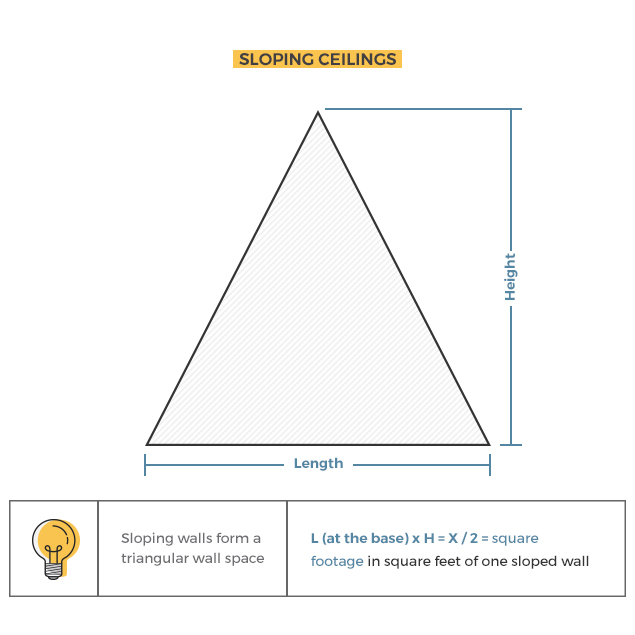Use this handy tool to plug in the dimensions of your painting project, calculate the number of square feet and find how much paint you need per gallon for your interior room, ceiling or exterior siding.
Ready to start your Painting Project?
Find ProsOn This Page:
Tips on Measuring for Paint
Before you begin, take the room measurements in the list below – round to the nearest foot. If you have cathedral ceilings that create sloping walls, follow the special case instructions on how to find this square footage.
To ensure you will have enough paint, do not worry about excluding areas not to be painted, such as windows and doors. A 10 percent waste allowance is automatically added to the total.
1. Wall Height
Measure from floor to ceiling.
2. Wall perimeter for areas you plan to paint
Measure the length of each wall. Add all length figures together to obtain the total horizontal distance, or perimeter.
3. Ceiling width and length
Omit if you do not plan to paint your ceiling.
4. Sloping ceilings (if applicable)
Sloping walls form a triangular wall space. To calculate a triangle’s square footage, multiply the length of the wall at the base of the triangle by its height and divide by 2.

How to Calculate:
To find the amount of paint you need per wall, use this simple formula:
W x H = AREA in square feet
360 = approximate square footage covered by one gallon of paint
AREA / 360 = # of gallons needed to paint your project
Types of Paint
Choosing a finish is an important part of the painting process. Talk to a local painter to make sure you get the best results. In the meantime, here’s a general breakdown to help you get started:
Interior:
If you’re painting the interior of your home, eggshell and satin paint finishes are easy to clean. Semi-gloss is a great option for bathrooms, since it can handle more moisture than other paints. Matte finishes work well in low-traffic areas since they’re more prone to stains.
Exterior:
For an exterior paint job, shoot for low-sheen or semi-gloss finishes for easier cleaning. Some pros prefer high-quality flat latex acrylic. Keep in mind that the higher the gloss rating, the more noticeable surface imperfections beneath the paint will be.
Cost Factors
While all painting jobs are different, there are a few variables that are sure to impact the cost of your project. Keep an eye out for these cost factors:
- Size of the room
- Number of rooms
- Whether the ceiling is being painted
- Sloped ceilings
- Difficult-to-reach areas
- Textured walls
- Type of paint
- Paint brand
- Labor
Average cost of an interior paint job:
Painting a home interior costs $1,780 on average. An entire 2,300-square-foot home can cost between $4,000 and $11,000 to paint.
Average cost of an exterior paint job:
You can expect an exterior paint job to cost $2,825 on average. Stucco and brick homes cost an average of $1 more per square foot to paint than vinyl or wood exteriors.
FAQ
How much paint is needed for a 12’x12’ room?
You’d need about 1.5 gallons of paint to cover a 12’x12’ room with 8-foot-high walls.
How much does 5 gallons of paint cover? How much does a quart cover?
According to our paint estimator, 5 gallons of paint can cover as much as 1,800 square feet. A quart of paint will coat about 90 square feet of space.
How many square feet does a gallon of paint cover?
The paint coverage per gallon of paint is about 360 square feet, according to our paint coverage calculator.
How much paint do I need for 2,000 square feet?
5.5 gallons of paint should be sufficient to cover 2,000 square feet, according to our paint calculation formula.
How many coats of paint do I need?
Two coats of paint are usually a safe bet, assuming you use primer. But the number of coats you need varies depending on the quality of paint and the color. For example, painting a light shade over a dark one may require extra layers.
 Tile Calculator: How to Calculate the Number of Tiles Needed
Tile Calculator: How to Calculate the Number of Tiles Needed  Concrete Calculator
Concrete Calculator  Drywall Calculator
Drywall Calculator  Vinyl Flooring Calculator
Vinyl Flooring Calculator  Wallpaper Calculator
Wallpaper Calculator 

Are You Familiar With This Topic? Share Your Experience.